key takeaways
- Nurses are key contributors during emergency events like Code Blues and Rapid Response.
- Studies suggest there may be a link between nurse empowerment and in-hospital cardiac arrest performance.
- Hospitals can empower nurses by investing in education and training, removing barriers caused by outdated tools and technology, utilizing nurse mentorship, and encouraging nurses to step into leadership roles.
Whether they’re relying on gut instinct to advocate for a patient who is starting to deteriorate — or drawing on their expertise to act quickly and decisively during a code — nurses are proven contributors in emergency response. Since they often have in-depth knowledge of the patient, equipment, and emergency protocols, it makes sense to empower nurses to use their skills and knowledge in an emergency event.
So why doesn’t it always happen?
Reasons are varied. The pressure and stakes of responding to a life-or-death emergency can rattle nerves and affect confidence in even the most experienced nurses. Role confusion is also common and can make nurses hesitant to step up.
Whatever the reasons, it’s worthwhile for hospitals to invest some time and energy into addressing these obstacles and empowering their nurses to respond fully in an emergency event. Keep reading as we dive deeper into the benefits of empowering nurses and strategies for making it happen.
Benefits of empowering nurses in emergency response
Can empowering nurses translate to better outcomes?
Recent studies have looked at the relationship between in-hospital cardiac arrest (IHCA) performance and nurse empowerment. One study of 9 hospitals from the American Heart Association’s Get With The Guidelines®-Resuscitation registry showed that hospitals with higher IHCA survival rates empowered their nurses to function at high levels of clinical practice and become resuscitation leaders. 1-2 Examples included nurses leading bedside defibrillation, serving as resuscitation leader during the event itself, and becoming clinical champions of resuscitation care at their hospital. By contrast, lower-performing hospitals confined nurses to more restrictive roles during events.1-2
In another study that focused on rapid response teams at high- and low-performing IHCA hospitals, high-performing hospitals were more likely to empower nurses to activate the rapid response based on their judgment and expertise — without running it by a physician first. At lower-performing hospitals, nurses were more likely to report feeling stressed about being judged or considered incompetent if they called a rapid response unnecessarily.3
The bottom line: While these studies don’t prove causation, there’s clearly a link between IHCA performance and nurse empowerment that’s worth exploring.
Other benefits to consider:
Hospitals stand to benefit from empowering their nurses in other ways as well:
- Less hesitation during a code. This is critical in time-sensitive events like IHCA since any delay can affect the quality of the overall response and the patient’s outcome.
- Increased job satisfaction for nurses. Not surprisingly, a sense of empowerment, agency, and autonomy is linked to nursing satisfaction4 —particularly important amidst the current healthcare staffing shortage crisis. And Code Blue nurses are especially vulnerable to burnout because of the stress of responding to high-stakes events and the associated emotional toll when patients do not survive.
Strategies to empower nurses
Invest in education, training, and feedback
Nurses are more likely to feel empowered to speak up and act without hesitation when they feel confident and prepared. Ongoing education and consistent feedback can help.
- Establish a robust mock Code Blue program to help clarify team roles, reduce confusion during an event, and combat nerves.
- Provide regular feedback using strategies like hot debriefing and resuscitation report cards to increase knowledge and confidence.
- Pair formal training and feedback with encouraging nurses to trust their gut. Their instincts and observations of their patients are key assets as well.
Equip nurses with the right tools and technology
Avoid unnecessary obstacles that can hinder nurses’ work — like disorganized crash carts and cumbersome paper documentation methods. Tools like crash cart automation and electronic code documentation remove distractions and allow nurses to focus their attention and skills on responding to the arrest.
Encourage nurses to become leaders in resuscitation and rapid response
Take a cue from the studies above and put nurses in leadership positions — whether that’s empowering them to activate a rapid response or take on a leadership role during the code.
Take advantage of nursing mentorship
Studies show that nursing mentorship programs can help prevent feelings of burnout and disempowerment. They’re especially important for new nurses, who can benefit by asking questions, getting advice from more senior nurses on difficult cases, and building their confidence.5
RELATED ARTICLES
Keep reading
For more insight into the role of nurses in Code Blue events, read our interview with an experienced nurse and long-time Code Blue responder next.
References
-
Cumpian TL, Yasmeh B, Jahangir A. (2020.) Editorial commentary: Nurses as essential members of an effective in-hospital cardiac resuscitation team. J Hosp Manag Health Policy. http://dx.doi.org/10.21037/jhmhp-20-18
-
Guetterman TC, Kellenberg JE, Krein SL, et al. (2019.) Nursing roles for in-hospital cardiac arrest response: higher versus lower performing hospitals. BMJ Quality and Safety. http://dx.doi.org/10.1136/bmjqs-2019-009487
-
Dukes K, Bunch JL, Chan PS, et al. Assessment of Rapid Response Teams at Top-Performing Hospitals for In-Hospital Cardiac Arrest. JAMA Intern Med, 179(10):1398-1405. https://doi.org/1001/jamainternmed.2019.2420
-
Gottlieb LN, Gottlieb B, Bitzas V. (2021). Creating empowering conditions for nurses with workplace autonomy and agency: how healthcare leaders could be guided by strengths-based nursing and healthcare leadership. J Healthc Leadersh. 13:169-181. https://doi.org/10.2147/JHL.S221141
-
Gularte-Rinaldo J, Baumgardner R, Tilton T, Brailoff V. (2023.) Mentorship Respect Study: A Nurse Mentorship Program’s Impact on Transition to Practice and Decision to Remain in Nursing for Newly Graduated Nurses. Nurse Lead, 21(2): 262-267. https://doi.org/10.1016/j.mnl.2022.07.003





